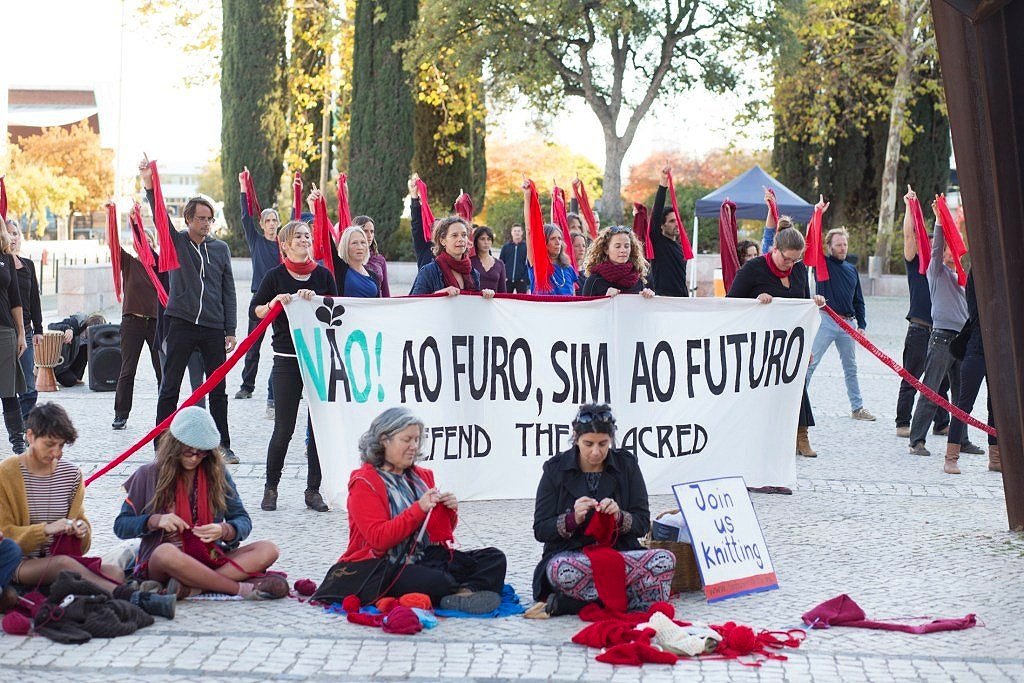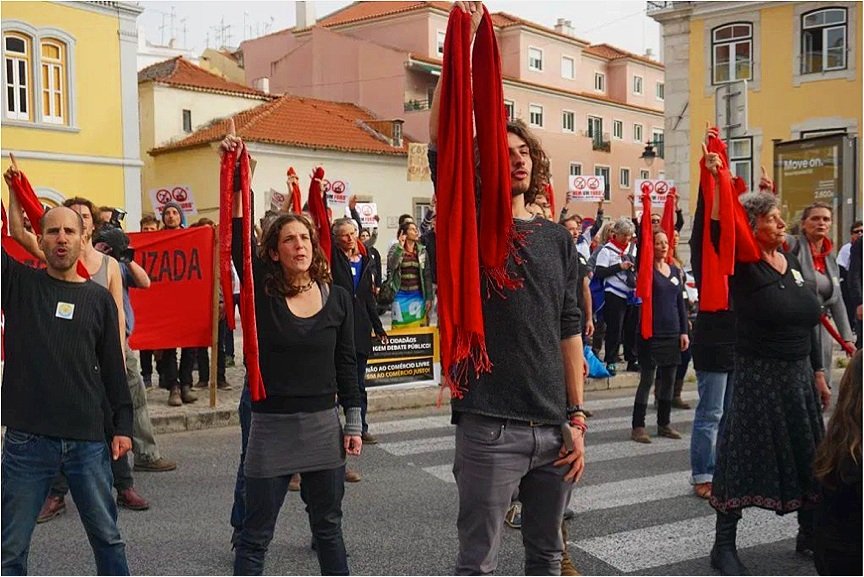The rebel side of knitting - Linha Vermelha in climate action
By Teresa Lorena Machado
* a Portuguese version of this article is available at the bottom of this page
Web Summit, Lisbon, 9 November 2017. The Red Line organised, in partnership with Tamera, an action the same day Al Gore visited the summit
“Knitting to raise awareness and mobilise” is the driving motto of the Red Line, the campaign that since 2016 has been fighting the exploitation of fossil fuels in Portugal. The red thread was first knitted by João Costa, a climate activist with whom we spoke to learn more about this example of urgent but pleasurable and intergenerational activism.
In the etymology of radical lies the word root, and in light of climate change, its inceptive causes have long been known: non-renewable energy projects are the primary cause leading greenhouse gas emissions to skyrocket. Today, governments produce more than twice as much fossil fuel as is compatible with a global temperature increase of 1.5ºC. But despite the disastrous ecological context of our times, and to add insult to injury, in 2015, the Portuguese government was preparing fifteen new contracts for fossil fuel exploration on its territory with international companies. The planned concessions for oil and natural gas extraction not only covered very large areas affecting settled communities but also hadn't been subjected to environmental impact assessments, and expressly or by omission assumed the hydraulic fracturing technique (fracking).
Extract of Australis Oil & Gas project presentation on the Portuguese contracts (Source: https://my.visme.co/view/g78e3qnw-english)
Red Line (Linha Vemelha) emerged precisely with the aim of preventing the imminent socio-ecological catastrophe. And after kilometres of threads knitted at events and demonstrations, widespread awareness and popular mobilisation succeeded in ceasing the contracts!
Inspired by the Knitting Nanas Against Fracking, Linha Vermelha began to weave the red thread in June 2016 in the gardens of the Gulbenkian Foundation, which until November 2019 owned Partex Oil and Gas. The afternoon of peaceful disobedience inspired its participants as knitting served simultaneously to contest and relax, prompting this practice as one of rebellion and collective care. While conversing about global warming and sewing techniques, the thread unfolded into many others, giving rise to the campaign that would run across Portugal in the fight against new fossil fuel extraction.
Action to launch the campaign "gas is going backwards", bringing together national and local organisations
Knitting is based on joining threads, and in this case it united worlds. With the involvement of several haberdashers, crochet, macramé, and informal knitting groups - ecosystems traditionally inhabited by the elder and the feminine - local groups were created to protest against the planned extractions and in defence of the planet, bringing together knitters and activists. The red thread marks a "stop" of double significance: a physical barrier preventing entry to the local explorations, and a symbolic one, signalling the increase of the earth's global temperature. By deploying knitting as a civil disobedience action for climate justice, Linha Vermelha also reclaims the very practice itself, today abandoned due to the "artificially low energy prices that allow us to buy goods at a much lower value than they actually cost", says João Costa.
Bajouca - July 13 2018. The Red Line in situ, where the company Australis Oil & Gas intended to drill & extract fossil gas
Sewing in public and with such intention is disruptive. Knitting has brought communities together and made possible to have knitters discussing climate issues and activists knitting. This practice reinforces conviviality, and unveils how climate change affects everyone and there is no one who can't talk about it. “I think it's always very useful to have these conversations between two worlds", says João. The activist also notes how this grounding practice makes certain conversations lighter and more empathic: "with knitting, talking about the complexity of climate change is much easier".
September 22th 2018. Linha Vermelha with the “Mesh Gang” - a knitting group from Pombal, Portugal. Here caught knitting & exchanging about the climate crisis and the Red Line’s work
But as befits red, the story of this campaign is not just a pleasurable and grounding one. It is also woven of resilience and struggle, involving an enormous local and national mobilisation to halt the already established contracts with the companies who had bought or leased the land for the extractions, and thus reverse the impending calamity.
Lisbon, February 23th 2017. Tamera holding red lines & demonstrating in front of the Portuguese National Assembly
Today, after having broken all fifteen contracts, João shares that the biggest challenge of the campaign has been the real convergence of the two worlds and getting the nanas to truly integrate the red line command. Despite their engagement throughout the campaign, João acknowledges the difficulties in making the knitters' agenda one of climate justice, where the community would engage beyond the local actions, viewed especially as local knitting events. True cooperation requires much work and determination, but João reminds that the urgency of today's challenges require us to be much more intersectional, and to have greater convergence and solidarity between struggles.
The campaign is now busy legitimising the work done so far with legislation to prevent the creation of new fossil fuel extraction contracts in Portugal. In the activist's eyes, while this might not be the highest priority, it certainly is key to build a movement for climate justice in Portugal, which, according to João, still doesn't fully exist.
The companies are forced to abandon the contracts in Algarve due to popular pressure. The popular victory gets featured in national news
Linha Vermelha thus unpacks important lessons for society today. It is a liminal message warning us of our warming Earth. It is a reminder that we can unite different worlds talking about the same issue. It is a proof that disruptive activism can also be slow, intergenerational and intersectional. It is a reclamation of an ancient practice that in times of globalisation has disappeared. Ultimately, it is an attempt to build a history of disobedience based on the convergence of diverse voices, to create radical mobilisation for the climate in Portugal.
/ / /
portuguese version
O lado rebelde do tricot - Linha Vermelha em acção climática
“Tricotar para sensibilizar e mobilizar” é o mote que dá corpo à Linha Vermelha, a campanha (apoiada pela Guerrilla) que desde 2016 combate a exploração de combustíveis fósseis em Portugal. As suas primeiras linhas foram tecidas por João Costa, um ativista pela justiça climática com quem falámos para conhecer melhor este exemplo de ativismo urgente mas prazeroso, e intergeracional.
Na etimologia da palavra radical descobre-se a palavra raiz. No que toca às alterações climáticas, a ciência não se cansa de dizer: a raiz deste problema reside nos projetos de energia não renovável que fazem disparar as emissões de gases com efeito de estufa para a atmosfera. Hoje, os governos produzem mais do dobro dos combustíveis fósseis dos que são compatíveis com um aumento da temperatura global de 1,5ºC. Embora os alertas - e para juntar insulto à injúria -, Portugal preparava-se em 2015 para efetivar mais quinze novos contratos de explorações de combustíveis fósseis no seu território com empresas internacionais dos setores do petróleo e gás natural. Todas as concessões previstas abrangiam áreas muito grandes afetando comunidades locais, não tinham sido sujeitas a avaliação de impacto ambiental, e assumiam expressamente ou por omissão a técnica de fractura hidráulica (fracking).
Foi com o objetivo de impedir que tais concessões fossem avante que surgiu a Linha Vermelha. E após quilómetros de linhas tricotadas em eventos e manifestações, a sensibilização e a mobilização popular sucedeu em travar os contratos!
Inspirada pelas Knitting Nanas Against Fracking, foi numa tarde de Junho de 2016 que a Linha Vermelha começou a tecer o cordão vermelho nos jardins da Fundação Gulbenkian, que até Novembro de 2019 detinha a petrolífera Partex Oil and Gas. Esta tarde de desobediência pacífica contagiou quem nela participava, pois ao mesmo tempo que se contestava, descontraía-se, fazendo do tricot um promotor de cuidado coletivo. Numa tarde entre conversas sobre o aquecimento global e técnicas de costura, a linha desdobrou-se em muitas outras, dando origem à campanha que iria correr Portugal no combate a novas prospecções e explorações de combustíveis fósseis.
O tricot tem por base a união de fios e, neste caso, veio unir mundos. Com o envolvimento de várias retrosarias, grupos informais de tricot, crochet, macramé - geralmente ecossistemas no feminino e de faixas etárias avançadas -, criaram-se grupos locais de protesto contra as explorações previstas e em defesa do planeta, juntando tricotadeiras e ativistas. A linha que tecem marca o “stop”, de dupla significância: uma barreira física que impede a entrada nas explorações, e a simbólica do limite do aumento da temperatura global da terra. Ao utilizar o tricot como ação de desobediência civil pela justiça climática, a Linha Vermelha reivindica também a própria prática do tricot, hoje em desuso devido aos “preços artificialmente baixos de energia que nos permitem comprar bens a um valor muito mais baixo do que aquele que realmente custam”, afirma João Costa.
Tricotar em praça pública com esta intenção é disruptivo. O tricot juntou comunidades e possibilitou ter tricotadeiras a falar sobre clima e ativistas a tricotar. Esta prática reforça a convivialidade, e desvenda como as alterações climáticas afetam toda gente e não há quem não possa falar sobre elas. “Acho que é sempre muito útil haver estas conversas entre dois mundos”, conta João. O ativista nota também como o tricot, sendo uma prática relaxante, torna certas conversas mais leves e empáticas: “com o tricot, falar sobre a complexidade das alterações climáticas é muito mais fácil”.
Mas como é próprio do vermelho, a história desta campanha não é apenas leve e prazerosa. É também tecida de resiliência e luta, tendo implicado uma enorme mobilização local e nacional para conseguir quebrar os contratos já estabelecidos com as empresas que tinham os terrenos comprados ou cedidos para as explorações, e assim reverter a situação de calamidade eminente.
Hoje, após terem conseguido quebrar os quinze contratos previstos, João confessa que o maior desafio da campanha tem sido a convergência dos dois mundos e fazer com que as tricotadeiras integrem verdadeiramente o comando da Linha Vermelha. Apesar do seu envolvimento ao longo da campanha, João reconhece as dificuldades em fazer da agenda das tricotadeiras uma de justiça climática, onde a comunidade se envolveria para além das ações locais, vistas como apenas mais um evento local de tricot. Cooperar verdadeiramente dá trabalho, mas João relembra que a urgência dos desafios de hoje exigem que sejamos muito mais interseccionais e que haja uma maior convergência e solidariedade entre lutas.
A campanha está agora ocupada em legitimar o trabalho até agora feito com legislação que impeça a criação de novos contratos de exploração de combustíveis fósseis em Portugal. Aos olhos do ativista, embora tal não seja a maior prioridade, é certamente fundamental para construir um movimento pela justiça climática em Portugal, algo que segundo João, ainda não existe verdadeiramente.
Assim, a Linha Vermelha revela lições importantes para a sociedade atual. É mensagem liminar para que não se ultrapasse o aumento em 1,5ºC da Terra que aquece. É lembrar que podemos unir mundos diferentes a falar sobre o mesmo assunto. É reconhecer que ativismo disruptivo pode ser também lento, intergeracional e intersecional. É comunidade de partilha de um saber que em tempos de globalização desapareceu. Em última instância, é construir uma história de desobediência com base na convergência de vozes diversas, para criar um caminho de mobilização radical pelo clima em Portugal.






